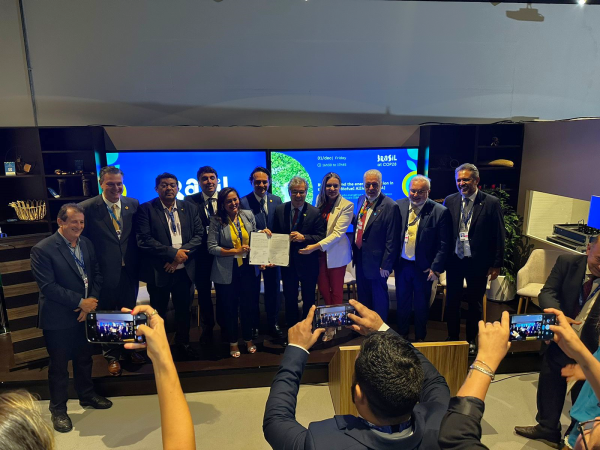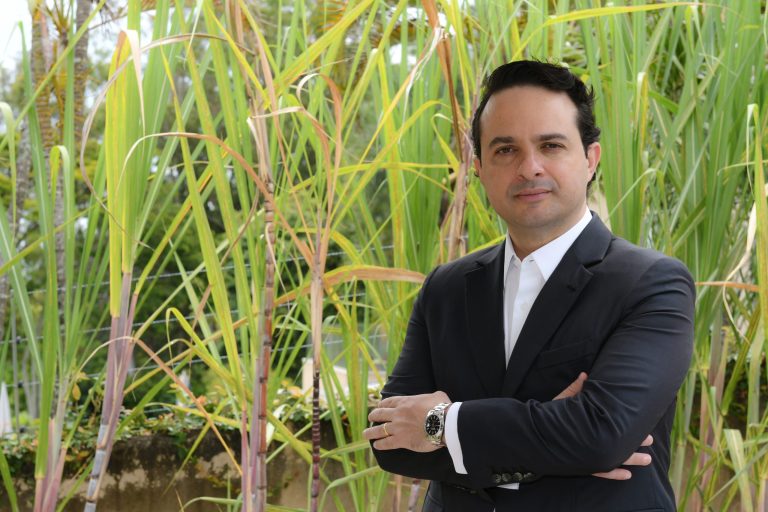São Paulo – An agreement to promote Brazilian ethanol on international markets was signed between the Brazilian Sugarcane Industry and Bioenergy Association (Unica) and the Brazilian Trade and Investment Promotion Agency (ApexBrasil) at the United Nations Climate Change Summit (COP28) in Dubai, in late 2023. The agreement aims to facilitate meetings, events, and missions between Brazil and countries in the Global South, mainly Africa and Asia.
The activities are expected to begin in mid-2024. The countries the project will prioritize in its first stage will be Angola, South Africa, Mozambique, Kenya, and Ethiopia in Africa and Indonesia, India, Thailand, Pakistan, the Philippines, and Vietnam in Asia. Some Arab countries could be included later. The document was signed by Jorge Viana, president of ApexBrasil, and Evandro Gussi, president and CEO of Unica.
In an interview with ANBA, Gussi (pictured above) said ethanol plays a relevant role in complementing the decarbonization of the global transport matrix. “We did not make that up. It is what the International Energy Agency (IEA) says, that bioenergy – in which ethanol is included – needs to triple by 2030 so that we can carry out the energy transition,” he said.
For this to happen, Gussi said it would be necessary to have “different technological pathways capable of delivering emissions reductions, decarbonization, and, with that, overcoming humanity’s great challenge in the 21st century.”
The CEO said biofuels play a crucial role in the Global South, where African and Arab countries are located. “Why? Ethanol, when produced sustainably– as in Brazil and around the world – without deforestation or competition with food, is highly effective in reducing emissions, up to 90% compared to gasoline,” he informed.
Another critical point that Gussi highlighted was that ethanol does not require any investment or change in the countries’ existing infrastructure, unlike the hundreds of billions of dollars needed to have a fleet of electric vehicles (EVs).
“If today in an African country or Arab country, we start mixing ethanol in gasoline, we don’t need to change the infrastructure. That same gas station, fuel tank, and pump that today fuels gasoline without ethanol may start having gasoline with 10% or 20% ethanol tomorrow and start reducing emissions immediately. Our studies showed that up to 20% mix [of ethanol in gasoline] can be used with cars worldwide – that’s just talking about vehicles that aren’t flex fuel,” said the CEO.
Gasoline in Brazil currently contains 27% ethanol, according to the executive. “So the first part of our ApexBrasil project concept is that ethanol is a quick, easy, and cheap solution to bring about decarbonization immediately,” he declared.
According to Gussi, the first part of the agreement’s work will be to export the concept so that countries can produce as much of their own ethanol as possible. “So one of the messages we have been taking to the Global South is – do you have the conditions to produce ethanol? Then, produce it. You will be reducing emissions and will not cause any damage to the vehicle or the engines. In general, if the country is an oil importer, it will improve its trade balance, create jobs, generate income for the countryside and the cities, and have a solution that does not cost billions of dollars for society to pay for infrastructure,” he said.

The Arab countries were not included in the project initially because “they are nations where ethanol production is more challenging due to the desert climate,” said Gussi.
The CEO said the project wants firstly “to provide the minimum supply to the African continent to guarantee the maximum energy security possible, and secondly export Brazilian ethanol to these countries.” According to Gussi, Brazil currently exports around 3% of its production, mainly to the United States and Europe. “But with the climate change issue emergency, there is a tendency for that to intensify,” he declared.
A third step would be to encourage the automobile industries in those countries to invest in flex-fuel cars. “The major automakers [in Brazil] have invested in flex-fuel cars [powered by ethanol and gasoline], such as Toyota, Volkswagen, and the Stellantis group – which includes brands such as Fiat, Chrysler, and Jeep. These manufacturers have already publicly positioned themselves saying that ethanol is part of the solution and will be an extremely relevant complementary solution in an essential part of the world,” he said.
Electric vehicles
“I’m not against electrification. We will need all technological routes to achieve decarbonization. But I can say that ethanol is quick, easy, and cheap,” said Gussi. For him, EVs would be the best option in many countries, especially in Europe. “But there will be a relevant part of the world – which is the object of our interest – the Global South, in which it is not a feasible or intelligent solution,” he said.
According to the Energy Research Office (EPE) estimates, Brazil would need an investment between USD 220 billion and USD 300 billion to have a robust charging station network to have a sizeable portion of EVs in its fleet.
“This is a challenge for Brazil and all countries in the Global South, which includes the African continent and a part of the Arab countries. While ethanol brings decarbonization without depending on investment in infrastructure, it can start to be used in up to 20% of the current fleet, that is, in cars already on the roads,” he said.
Gussi recalled many African and Asian countries suffer from energy insecurity, with constant blackouts. “They already have electricity challenges today, so bringing more electricity demand to these countries is not an intelligent solution. That is why ethanol will lead to decarbonization without compromising or increasing the electricity demand, which is already an issue,” he declared.
Signing of agreement at COP28
For Gussi, the signing of the agreement was a watershed moment. “ApexBrasil and us [Unica] decided to make this signature on the occasion of COP28 in Dubai, an important move when one of the world’s largest oil producers called the Conference on Climate Change, showing that this issue of decarbonization and environmental protection has no borders, we are all accountable,” he said.
With the ApexBrasil agreement, Gussi said that the sector will gain strength to hold events, bilateral meetings, and technical studies outside Brazil, in addition to receiving foreign delegations to show how the country has developed this sector over the last 50 years.
“The agreement will be essential so that we can take it to these countries through events called Ethanol Talks and receiving international missions here in Brazil so they can understand what Brazil has done. Brazil, today, is considered the role model for the use of biofuels and ethanol in the world, so we have been making this history and will continue to make it with the support of ApexBrasil. We will take it to these countries on our radar, and we want to welcome them here to show, hands-on, how Brazil has addressed these issues,” he explained.
Translated by Elúsio Brasileiro




